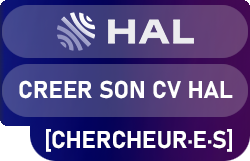Loading...
Vous souhaitez un CV académique, soigné et pérenne ?

Découvrez tous les avantages du CV HAL !
En un clic, le CV HAL regroupe automatiquement et structure vos publications déposées sur l’archive ouverte et valorise votre parcours et domaines d’expertise
Derniers dépôts sur hal.science
-
-
-
-
M.-A. Dufour, Grégory Pinon, Elie Rivoalen, Grégory Germain. Influence of wakes interaction and upstream turbulence on three tidal turbines behaviour. Journal of Physics: Conference Series, 2024, The Science of Making Torque from Wind (TORQUE 2024) 29/05/2024 - 31/05/2024 Florence, Italy, 2767 (5), pp.052017. ⟨10.1088/1742-6596/2767/5/052017⟩. ⟨hal-04663148⟩
-
Cindy De Jonge, Francien Peterse, Klaas G J Nierop, Thomas M Blattmann, Marcelo Alexandre, et al.. Interlaboratory Comparison of Branched GDGT Temperature and pH Proxies Using Soils and Lipid Extracts. Geochemistry, Geophysics, Geosystems, 2024, 25 (7), pp.e2024GC011583. ⟨10.1029/2024GC011583⟩. ⟨hal-04663147⟩
NOMBRE DE DOCUMENTS EN TEXTE INTÉGRAL
1 379 592
Liens utiles
Actualités
La journée se déroulera à partir de 9h dans l’hôtel Pereire de la fondation Simone et Cino Del Duca, 10 rue Alfred-de-Vigny, dans le 8e arrondissement de Paris. Accès gratuit, sur inscription.
Il y aura plusieurs exposés dans l'amphi Durand, dans l'espace Esclangon du campus Jussieu de Sorbonne Université. Ces exposés seront suivis de la remise du prix Demailly et d'un cocktail dans la tour panoramique de Jussieu.
- Comprendre les archives : vers de nouvelles interfaces de recherche reposant sur l’annotation sémantique des documents
Jeudi 23 mai – 12h30
- Optimiser la gestion des données de votre structure avec le DMP entité
Vendredi 24 mai – 12h30
Cette formation à distance d’une heure vous permettra de maitriser le processus de dépôt de publication scientifique dans HAL.
Accompagné d’un membre de l’équipe support du CCSD, vous réaliserez pas à pas le dépôt dans HAL d’une de vos publications scientifiques.
IMPORTANT : pour que cette formation soit efficace, il est recommandé d’y participer avec une publication scientifique à déposer dans HAL
Voir les types de document acceptés dans HAL : https://doc.archives-ouvertes.fr/deposer/les-types-de-document/
NB. Si vous découvrez HAL, suivez au préalable la formation « Démarrer dans HAL ».
Voici les dates et le lien pour vous inscrire :
Elle s'adresse à un public de doctorants et de chercheurs dans un objectif d'accompagnement à ces nouvelles pratiques scientifiques